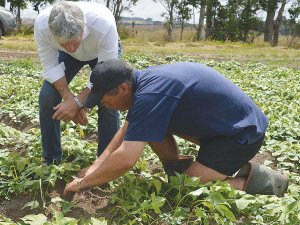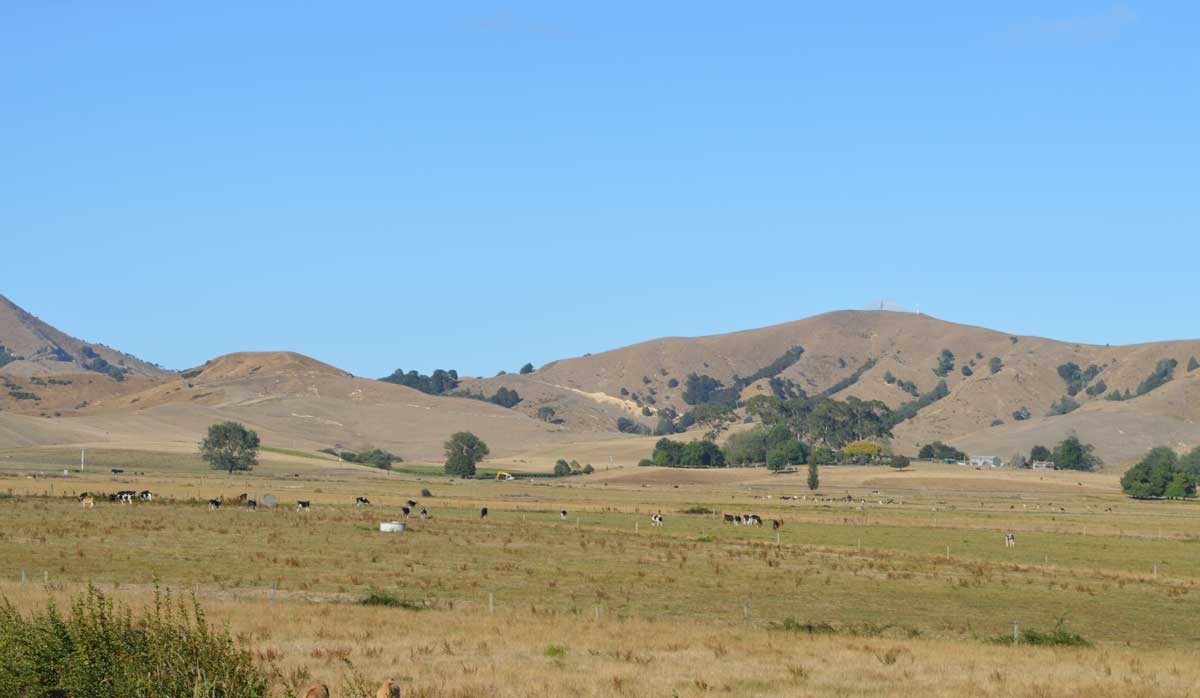Early drought fears ease in Hawke’s Bay, but caution remains
Fears of a serious early drought in Hawke’s Bay have been allayed – for the moment at least.
 Agriculture Minister Damien O’Connor visiting Andre De Bruin’s kumara farm in Dargaville earlier this month.
Agriculture Minister Damien O’Connor visiting Andre De Bruin’s kumara farm in Dargaville earlier this month.
Like many farmers in North Island, Dargaville kumara farmer Andre de Bruin is hoping for rain soon.
With 40 hectares of kumara crop under the ground, he remains hopeful.
“It depends on how long the dry weather lasts,” he told Rural News.
“As long as the dry doesn’t get too severe and kill the plants, we should be okay.”
De Bruin, who is also chairman of Vegetables NZ, hosted Agriculture Minister Damien O’Connor on his farm recently. O’Connor toured a paddock planted two months ago.
De Bruin says it’s hard to say how the dry weather will affect this year’s crop.
“We will only find out during the harvest,” he says.
Kumara is planted around November and December in Dargaville; from planting it takes about 120 days to harvest.
Some of the crop is transported directly to markets around the country; the remainder kept in storage for supply throughout the year.
De Bruin says while his farm is very dry, other farmers in Dargaville are better placed: some have had rain and some access to irrigation.
 |
|---|
|
Drought is affecting much of the North Island. |
O’Connor, who spent a day in Northland, says ground conditions across the region are varied.
He praised the resilience of farmers, saying good farmers are more prepared for such climatic events.
“Most farmers have got it... they need to be more prepared in future for disruptive events.”
O’Connor says mixed farming models will help farmers not only diversify their income but provide buffer to their incomes during droughts and floods.
On the possibility of a drought being declared in Northland, O’Connor says his department is working with Federated Farmers and Rural Support Trust with “a set formula”.
“We must not overreact and too quickly declare a drought: building reputation around an area for being unreliable as a farming block,” he says. “There are downsides to declaration of a drought: such areas can be seen as losing the ability to farm sustainably and this can impact land values.”
O’Connor also visited dairy farmer Scott Taylor at Tangiteroria, midway Whangarei and Dargaville.
Taylor says milk production is falling behind, compared to last season as farmers are drying off early.
On his farm in Taylor has dried off cows that would be calving in autumn: he’s done this a few weeks earlier than usual.
“Day after day of 25 to 30 degrees with no rain, no grass growth, it’s a no-brainer,” he told Rural News.
“We need rain soon to ease the pressure, if not things are going to get quite difficult.”
Taylor is still milking 230 cows once-a-day; feeding them turnips, grass silage and palm kernel expeller (PKE).
|
A landmark moment for New Zealand. That's how Prime Minister Christopher Luxon describes the conclusion of negotiations for an India-New Zealand Free Trade Agreement. Beef Progeny Test 2025: Genetic insights for NZ beef industryAt Pāmu’s Kepler Farm in Manapouri, mating has wrapped up at the across-breed Beef Progeny Test. HortNZ celebrates 20 YearsMore than 150 people turned up at Parliament recently to celebrate the 20th anniversary of Horticulture New Zealand (HortNZ). Biosecurity NZ urges vigilance for yellow-legged hornetsBiosecurity New Zealand says Kiwis should continue to keep an eye out for yellow-legged hornets (Vespa velutina) over the holiday season. Mental Health and Fitness Unite: The Push-Up Challenge comes to New ZealandThe Push-Up Challenge, an event which combines mental health and fitness, is set to launch in New Zealand in 2026. Agritechnica 2025: Claas, Fendt and Valtra claim 2026 Tractor of the Year AwardsLast month's Agritechnica event led to a wide group of manufacturers celebrating successes when the 2026 Tractor of the Year Competition winners, selected by a panel of European journalists, were announced in Hanover Germany. NationalAlliance commissions major heat pump system at Mataura, cutting coal use and emissionsAlliance Group has commissioned a new heat pump system at its Mataura processing plant in Southland.NZ meat industry seeks removal of US 15% lamb tariffMeat processors are hopeful that the additional 15% tariff on lamb exports to the US will also come off.Early drought fears ease in Hawke’s Bay, but caution remainsFears of a serious early drought in Hawke’s Bay have been allayed – for the moment at least.Consent Rollovers and $13b Savings: What the new RMA bills could meanThere was much theatre in the Beehive before the Government's new Resource Management Act (RMA) reform bills were introduced into…Rural bias?OPINION: After years of ever-worsening results from our education system, the startling results from a maths acceleration programme stood out like…Machinery & ProductsAgriSpread AS3000 Bulk Spreader: Precision spreading up to 52mManufactured in Ireland, tested and launched at Agritechnica in Germany, AgriSpread’s new AS3000 bulk spreader takes much of the technology…Agritechnica 2025: Claas, Fendt and Valtra claim 2026 Tractor of the Year AwardsLast month's Agritechnica event led to a wide group of manufacturers celebrating successes when the 2026 Tractor of the Year…New Case IH Puma series debuts with improved design & precision techCase IH used Agritechnica to reveal its new Puma series tractor, featuring what it claims is an entirely new vehicle…New Holland unveils “Il Trattore” concept at AgritechnicaCreating a great deal of enthusiasm at Agritechnica, the T5.120 ‘Il Trattore’ styling concept tractor was celebrating the legacy of…Deutz-Fahr unveils all-new 8 series tractor range at AgritechnicaAgritechnica was the launchpad for several “new” tractors, most reworks of existing models, but Deutz Fahr ‘s new 8 Series was… |